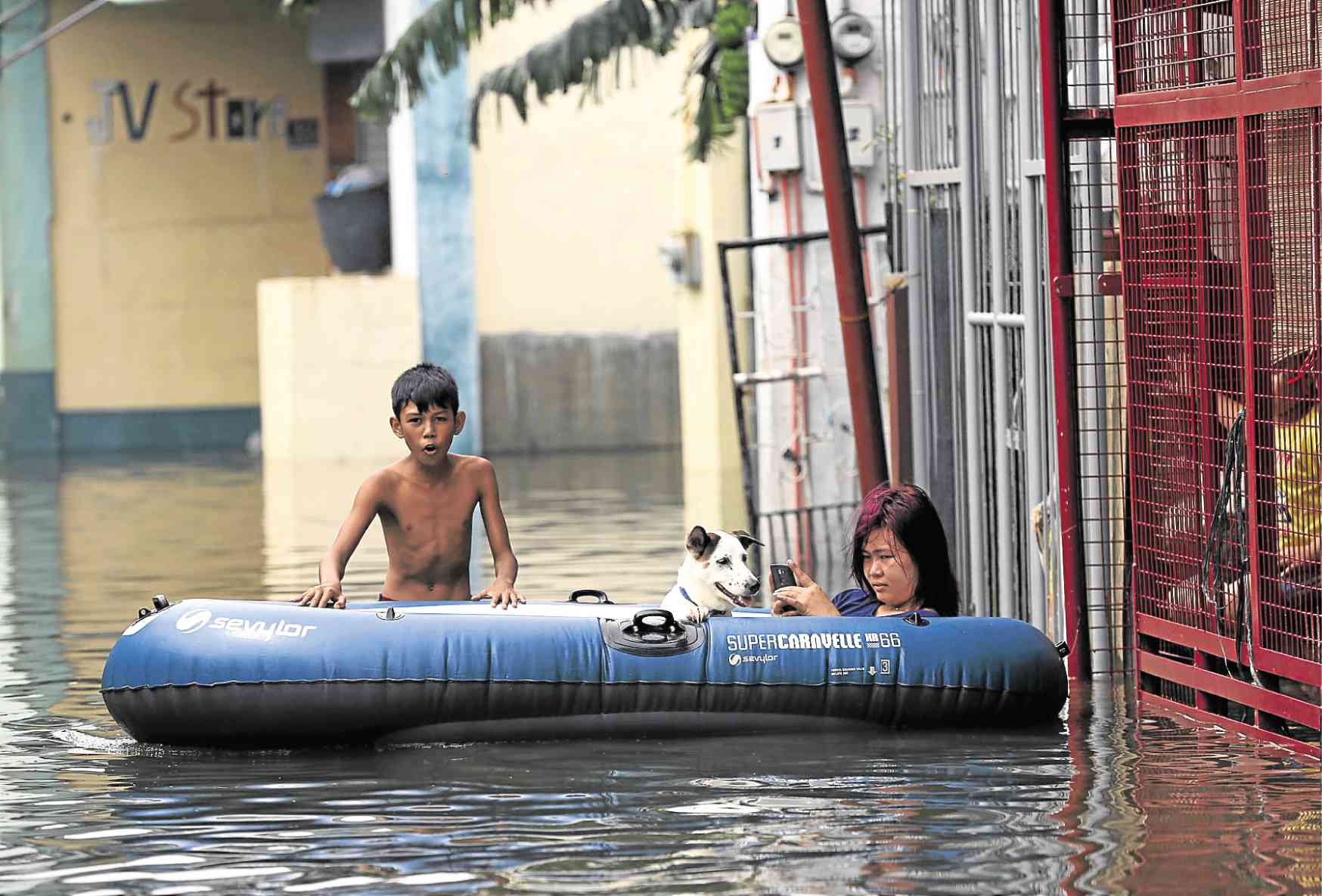In flood-hit Bulacan, life, feasts go on

NO DOG LEFT BEHIND With floodwaters still to subside, Mai Galvez and her dog, Utoy, use an inflatable boat to go to a store at Barangay Panginay in Balagtas town, Bulacan. —LYN RILLON
CITY OF MALOLOS — Bulacan residents try to maintain their normal routines, even celebrating feasts or proceeding with ceremonies, despite the floods that have ravaged most areas in the province.
On Thursday in this city, which suffered floods as high as 2 meters (6 feet), Health Secretary Francisco Duque III led the groundbreaking ceremony for the construction of a three-story building of Bulacan Medical Center.
Earlier on Wednesday, Bulacan celebrated its 440th foundation day with less fanfare. The province’s guests, Armed Forces chief of staff, Gen. Carlito Galvez, and Philippine National Police chief, Director General Oscar Albayalde, spent most of the day distributing relief goods to flood victims here and in other affected towns.
The provincial government on Wednesday placed Bulacan under a state of calamity due to the widespread flooding, hitting nearly all 24 towns and cities due to high tide and rains induced by the southwest monsoon.
Feast day
In Bulakan town, which was submerged in 10 centimeters (4 inches) of water, residents went through with the Feast Day of the Nuestra Señora de la Asuncion on Wednesday.
Feasts of saints and other celebrations are sacred to Bulacan residents, said Joey Rodrigo, tourism and information officer, to explain why these have to push through despite the adverse circumstances.
“It’s our way of expressing our deep faith. During the liberation of Bulacan [from Spanish colonial control during the Revolution], the Nuestra Señora de la Asuncion feast day was celebrated in Barangay Balubad,” he said.
Emergency
For days, floods from runoff rainwater and the high tide have affected Bulakan and the towns of Marilao, Bocaue, Guiguinto, Obando, Balagtas, Calumpit, Paombong and Hagonoy as well as parts of Malolos and Meycauayan City.
The floods cost the province more than P700 million in damaged crops and infrastructure, according to the Bulacan provincial disaster risk reduction and management office (PDRRMO).
Liz Mungcal, PDRRMO chief, said Meycauayan, Marilao, Calumpit, Hagonoy and Paombong had been placed under emergency state.
Water from the Sierra Madre has worsened flooding in Bocaue for the past years, said Mayor Joni Villanueva-Tugna. She said she was still waiting for the town council to declare Bocaue under a state of calamity to allow the town government to use funds to clean clogged canals that had aggravated flooding there.
The floods have not stopped business activities. At a bridge in Malolos, enterprising residents began fishing for tilapia washed away by the overflowing river. They put up shanty stalls at the side of the bridge to sell their catch to motorists.
In Pangasinan province, residents still need to brace for floods and the high tide after operators of San Roque Dam in San Manuel town said floodgates may be lifted only on Aug. 20.
Dam spill
The water elevation at the dam reservoir was 284.09 meters above sea level on Thursday, still higher than its normal level of 280 masl, said Odette Rivero, spokesperson of the National Power Corp.
Four gates, each opened by 4.5 meters, continued to release 935 cubic meters per second of water, she said. At the rate water was being released, reservoir elevation went down by 0.06 meters an hour, and it would take until Monday to get to 280 masl, she added.
San Roque Dam discharges excess water into Agno River which also catches water from upstream rivers like Ambayaoan in San Nicolas town, Viray-Dipalo in San Quintin and Tayug towns, and Banila in Umingan town.
Many areas in Dagupan City and Calasiao town were still underwater, including their business centers where boats, motorbikes and “kuliglig” (farm tractors) ruled the streets that were not passable to all types of vehicles in the past three days. —REPORTS FROM CARMELA REYES-ESTROPE AND YOLANDA SOTELO